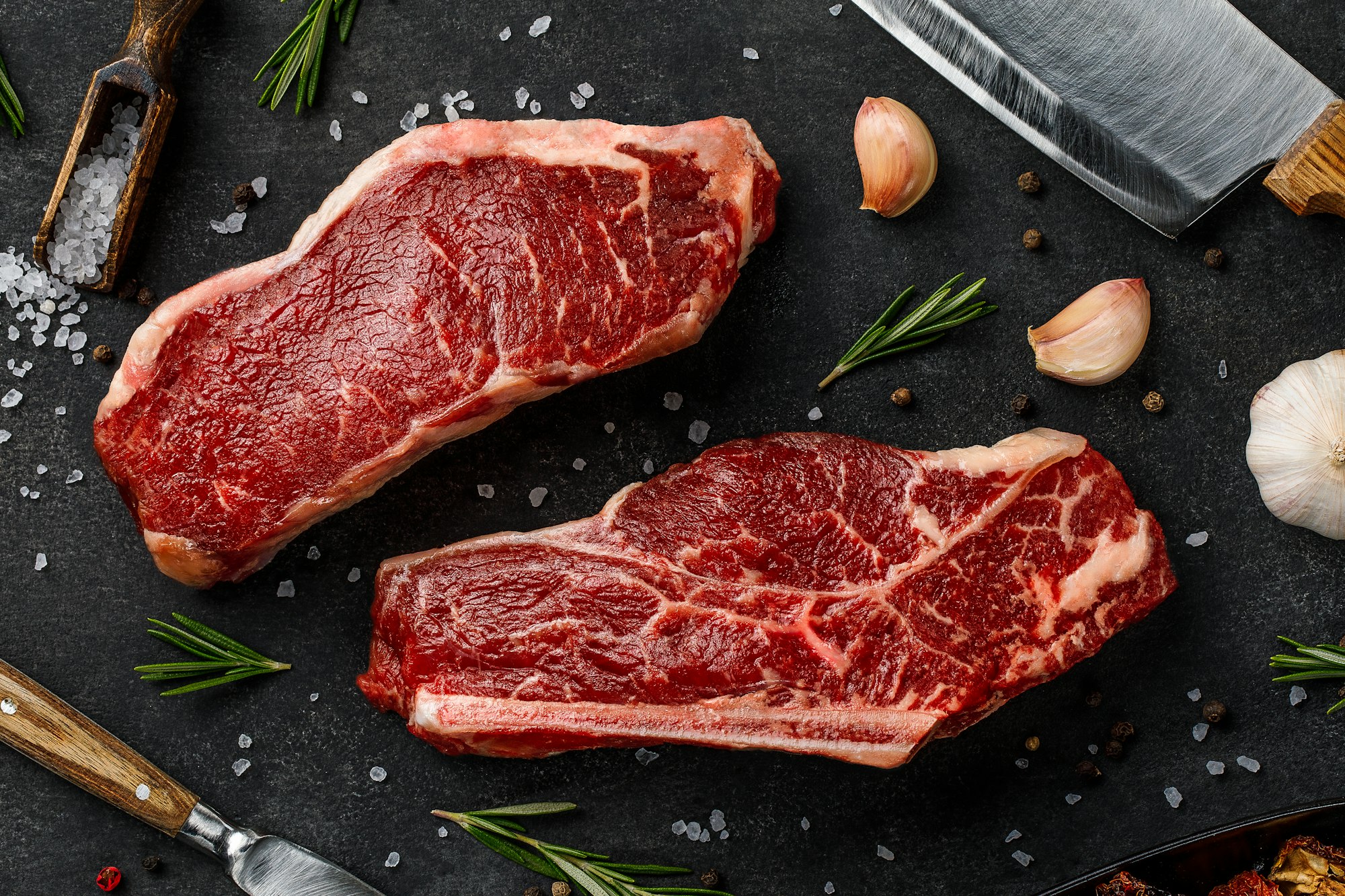You might be surprised to learn that over 70% of individuals following the carnivore diet experience a significant reduction in hunger within the first few weeks. When you're not feeling ravenous like you used to, it's actually a powerful indicator that your body is making a critical metabolic shift. This isn't about deprivation, but rather a profound physiological transformation where your system evolves from sugar-burning to fat-burning efficiency.
Something remarkable is happening inside your metabolism, and your diminished appetite isn't a weakness—it's a strategic signal that you're successfully rewiring your body's energy procurement mechanisms. Intrigued by what's happening beneath the surface?
Understanding False Hunger Signals on Carnivore

Why do some hunger pangs feel more intricate than a simple need for sustenance? Your body's hunger signals aren't always a direct call for nutrition. Hormones like ghrelin can trigger hunger sensations even when you're not truly depleted.
Your environment, psychological state, and physiological conditions dramatically influence hunger perception. Hormonal regulation plays a critical role in determining the complexity of these sensations.
Consider how processed foods manipulate your body's signals. These foods cause insulin spikes and drops that create artificial hunger, disconnected from actual nutritional requirements.
Your brain can misinterpret signals, mistaking dehydration for hunger or experiencing heightened cravings because of lack of sleep.
Psychological factors further complicate hunger dynamics. Fear, stress, and emotional states can profoundly impact your eating behaviors. Your perception of hunger isn't just about an empty stomach; it's a complex interplay of hormonal, environmental, and mental influences.
Insulin resistance and blood sugar fluctuations can intensify hunger sensations, making you feel ravenous even after recent consumption. Your body's metabolic processes aren't always clear-cut.
What feels like hunger might actually be a hormonal response, a survival mechanism, or a learned pattern from previous dietary habits.
Understanding these nuanced hunger mechanisms empowers you to distinguish genuine nutritional needs from complex physiological signals. In eating disorders like anorexia, the body can develop complex hunger adaptations that fundamentally alter how nutritional signals are perceived and processed.
The Carnivore Metabolic Switch: From Sugar to Fat

When you switch to a carnivore diet, your body kicks off a remarkable metabolic transformation. You'll experience a fundamental shift in how your system generates and employs energy, moving from carbohydrate dependency to fat metabolism.
This change means your body begins prioritizing fat as its primary fuel source, which triggers significant changes in its hormonal and metabolic processes.
Throughout this energy adaptation, you'll notice stabilized energy levels that aren't disrupted by carbohydrate-induced spikes and crashes. Your body becomes increasingly efficient at breaking down and employing stored fat, which contributes to sustained energy over the day.
The high protein and fat intake helps maintain muscle mass while providing a steady energy stream that doesn't rely on frequent glucose replenishment.
Your hunger signals will also transform in this process. Instead of experiencing frequent, intense hunger, you'll likely feel more consistently satiated. The nutrient-dense animal products you consume provide extensive nutrition while keeping insulin levels balanced.
Research at the NIH indicates that the insulin sensitivity improvement can fundamentally alter how your body processes and utilizes energy.
During this adaptation, your body's hormone levels, specifically ghrelin and leptin, will recalibrate to support more stable and predictable hunger signals.
How Carnivore-Induced Ketosis Regulates Your Appetite

Digging into the complex world of ketosis and you discover how this metabolic state radically transforms your appetite regulation.
When you enter ketosis, your body undergoes significant hormonal shifts that suppress hunger and enhance satiety. Studies reveal a negative correlation between β-hydroxybutyrate and basal ghrelin concentrations, further supporting the hormonal mechanisms of appetite suppression. The initial metabolic transition can cause temporary fluctuations in hunger hormone dynamics.
Your ghrelin levels—the hormone responsible for signaling hunger—decrease, while your sensitivity to leptin increases, helping you feel fuller for longer periods.
As ketones flood your system, they stimulate the production of satiety hormones like GLP-1 and CCK, effectively reducing your desire to snack.
Your brain becomes more receptive to leptin signals, amplifying your feelings of fullness. The metabolic changes also stabilize your blood sugar levels and improve insulin sensitivity, further diminishing hunger pangs.
This impact extends beyond just hormones alone.
Your body shifts from glucose to fat as its primary energy source, becoming more efficient at utilizing stored fat. This metabolic adaptation reduces the energy required for food conversion and decreases superoxide production.
Furthermore, your gut microbiota undergoes changes that could contribute to appetite suppression, though researchers are still investigating the precise mechanisms.
Animal Fat: Your Natural Appetite Suppressor

The hormonal cascade triggered by ketosis sets the stage for understanding fat's profound role in appetite suppression. When you consume fats, especially medium-chain triglycerides (MCTs), you're activating a complex hormonal response that reduces hunger.
MCTs are uniquely metabolized, rapidly absorbed into the portal system and oxidized by the liver, which distinguishes them from long-chain triglycerides (LCTs).
| Fat Type | Absorption | Satiety Effect |
|---|---|---|
| MCTs | Rapid | High |
| LCTs | Slow | Moderate |
| Blended Fats | Varied | Variable |
Your body releases appetite-regulating hormones like CCK, GLP-1, and PYY when fat enters the digestive system. These hormones communicate with your brain's hunger centers, signaling fullness and reducing subsequent food intake.
MCTs are especially effective, showing a more immediate impact on suppressing appetite compared to LCTs.
Starting Your Carnivore Journey: The First 30 Days

Shifting to a carnivore diet demands strategic navigation through metabolic adaptation, especially when moving from traditional high-carbohydrate eating patterns.
You'll want to implement a gradual approach that minimizes physiological shock and supports your body's shift, for many this can be a week to four weeks.
Start by slowly reducing carbohydrate intake while incrementally increasing animal protein and fat. Pay close attention to your body's signals throughout this adjustment phase.
Hydration becomes essential throughout dietary shifts. You'll need to increase water intake and consider electrolyte supplementation to maintain balance, especially if you sweat a lot from heat and humidity or frequently perform heavy workouts.
Sodium, potassium, and magnesium are vital for supporting your metabolic functions throughout this shift.

Use SALTT By Keto Chow For Efficient Electrolyte Intake
For many supplementing with bone broth can serve as an excellent support tool, providing both hydration and additional nutrients.
Monitor your energy levels and adjust food intake accordingly. Be mindful of potential undereating, which commonly occurs when people shift to the carnivore lifestyle as they are so indoctrinated in limiting eating.
Patience is key. Your body will gradually recalibrate its metabolic processes, and temporary discomfort is normal. Stay consistent, listen to your body, and make incremental adjustments as needed.
Carnivore's Impact on Your Hunger Hormones

Diving into the hormonal environment of the carnivore diet reveals complex metabolic transformations that fundamentally reshape how your body processes hunger and energy. As you shift, you'll notice significant shifts in key hunger hormones like leptin and ghrelin, which directly influence your metabolic signals.

These changes aren't just random; they're strategic adaptations your body undergoes to enhance energy utilization.
Key metabolic understandings include:
- Your insulin sensitivity improves, creating a more balanced internal environment
- Ketosis becomes a natural metabolic state, promoting efficient fat burning
- Hormone production receives enhanced support through high-fat dietary intake
The carnivore diet triggers a profound metabolic recalibration where fat becomes your primary energy source. This adjustment means your body learns to burn stored fat more efficiently, reducing inflammation and stabilizing blood sugar levels.
Initially, you might experience reduced hunger signals, which isn't a sign of malnutrition but rather an indication that your metabolic machinery is recalibrating.

Your hormonal framework transforms, with decreased ghrelin levels suppressing hunger and increased ketone production providing steady energy.
These changes represent your body's remarkable ability to adapt to a nutrient-dense, animal-based dietary approach, finally supporting improved metabolic health and potential weight management.
Reading Your Body's Signals on Carnivore

Every carnivore diet journey demands careful self-observation and responsive nutrition management. You'll need to tune into your body's unique signals and be prepared to adapt as you shift. Paying close attention to hunger cues, energy levels, and overall well-being becomes essential in understanding how this dietary approach affects you personally.
Your body will communicate important information through various indicators.
Monitor your energy, mental clarity, and digestive changes carefully. Initial discomfort is normal, but persistent issues might signal a need for adjustment. Note how different meats impact your metabolism and reflect on getting blood tests to track micronutrient levels.
Adapting isn't just about persistence; it's about intelligent responsiveness. You'll want to aim for a variety of meats to guarantee thorough nutritional intake.
Stay hydrated and plan meals strategically to minimize potential side effects. Be patient with your body's shift and remain open to subtle changes in how you feel.
Remember that carnivore isn't a one-size-fits-all approach. You must adapt to what works for you not what works for others.
Your willingness to listen, observe, and make informed adjustments will be your greatest asset in navigating this nutritional journey successfully.
Optimizing Your Carnivore Diet Nutrition
Successfully maneuvering the carnivore diet requires a strategic approach to nutritional intake. You'll want to focus on quality over quantity, prioritizing nutrient-dense foods that support your body's needs. Your meal planning should be intentional and flexible, adapting to your unique hunger signals and metabolic requirements.
Key strategies for effective nutritional management include:
- Listen carefully to your body's hunger cues, which might differ from traditional eating patterns.
- Aim for quality fat and protein in each meal, adjusting portion sizes based on hunger and activity level.
- Experiment with various meat cuts and organ meats to guarantee thorough nutrient absorption.
Please be mindful of potential nutrient use, potentially supplementing with vitamins or incorporating organ meats to maintain thorough nutrition.
As you adapt, you'll notice your hunger signals changing. Initially, you might experience increased hunger in healing phases, but this will stabilize.
Thriving Long-Term on the Carnivore Diet
The metabolic engine of the carnivore diet roars to life during long-term adaptation, transforming how your body processes nutrients and energy. As you continue this dietary approach, you'll notice significant changes in your physical and mental performance. Continuous weight loss and muscle definition become more pronounced, with your body becoming increasingly efficient at metabolizing fat as its primary fuel source.
Your energy levels and mental clarity will likely improve as you progress through the adaptation phase. The diet's focus on eliminating inflammatory foods can lead to enhanced overall health and reduced chronic condition symptoms.
Athletes following the carnivore diet will experience nuanced performance outcomes. While the diet can provide steady energy, some performers and bodybuilders find that strategic carbohydrate supplementation around game time can maximize work rates and heart rate responses.
The key is careful management and individual experimentation.
Long-term success depends on gradual change strategies and potentially supplementing missing nutrients. You'll want to monitor your body's response, making adjustments as needed to guarantee sustainable health and performance improvements while maintaining the diet's core principles.








